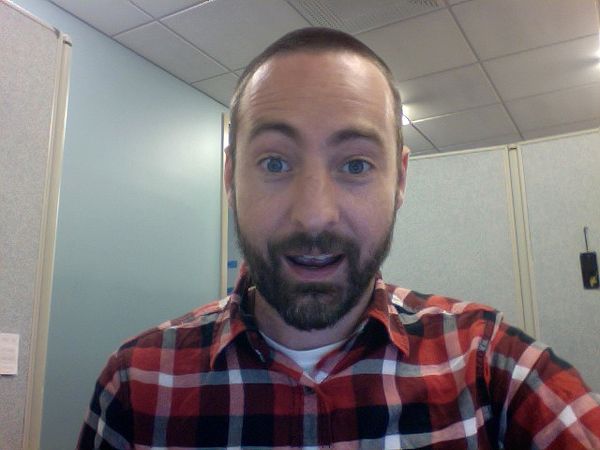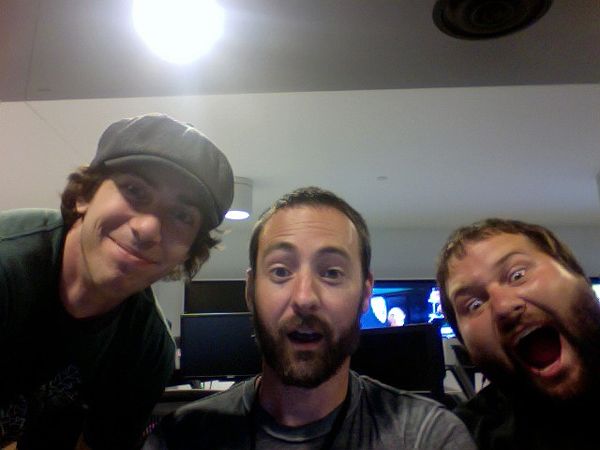Brian’s section from the “Same Thing Daily 2” video that came out a year ago. You can check out the rest by picking up a copy at SameThingDaily.Blogspot.com.
Brian Tunney is one of those guys who I think is a real good model to follow when it comes to working in the media side of the industry. Brian has had all sorts of jobs from being a pro rider, contributor to magazines, judging contests, and even some time as a team manager. These days he’s full-timing it at ESPN handling their action sports content. I figured it would be cool to find out a little bit more about his line of work and get a little background on how he got to where he is today. As you can see above, Brian decided to drop his latest part from the dvd “Same Thing Daily 2” to go along with this, so don’t forget to check out the rest of that video. All right, here’s what Brian has to say…
Name: Brian Tunney
Location: Jersey City. NJ
Years riding: I hit 25 this year….
Sponsors/Hook ups: I have a lot of friends across the industry that help me out and it’s very appreciated from all of them.
Education: I have a BA from Rutgers University, but I honestly believe that every day is still a learning experience, as dumb as that sounds to say.
Years at ESPN? Coming up on 2.5

Brian working hard from his office in New York…. sort of.
So I guess we should start out from the beginning. You were sponsored for many years as a pro rider. Who are some of the brands you rode for in that time?
Sean McKinney hooked me up with my first free frame from S&M (the first run of Sabbath frames), and from there I went to Hoffman Bikes, followed by Federal. Once Federal split up after Ian Morris left, I got hooked up by United for a bit, then went back to riding a Federal. I also rode for Primo for a long time, as well as DuFFS and Clif Bar. I was never a very “sponsor-able” rider though. I never won contests, wasn’t rewriting the book on flatland and was never going to be the cool guy that everyone wanted to be like.
Eventually you started your transition to the media side of things. How did you start getting involved with that side of things?
There was no transition. I was involved with writing for Dig, Ride BMX and a few other magazines while I was riding and competing, going back as far as 1997.
How long did you work for DIG? Did you work for or contribute to any other media outlets prior to ESPN?
I was with Dig for 11 years. For a long time, I also wrote press releases for record labels, like Jade Tree records and Polyvinyl records. Before that industry collapsed, bands would release new CDs, and those CDs would be sent to radio stations, magazines, and other media outlets for promotion. I would write 500 words about the record, why it was good and what it sounded like, which went out with the promo packets for new records. I also wrote for some music magazines along the way. And I did music clearance for Props for a few years too.
You were also the team manager for Eclat for a while in there as well. How did you get into that? Could you ever see yourself handling a TM job again?
Klaus and Harry at Wethepeople hit me up about the new brand, and asked me to come aboard. They do an awesome job and the team and parts are great, but when the ESPN job started, I had to pick one or the other because of time constraints. I don’t think I ever want to work directly with or for a BMX company again. éclat was a great fit for me and I enjoyed working with those guys and the team. But at this point in my life, I want to do a job that’s more fulfilling than making sure a BMX pro has the right stickers on his bike. (No offense to any team managers out there.)
How did the job from ESPN come about? I feel like you aren’t the kind of guy who would show up and tell them you are working for them now and take the nearest office with a red stapler in hand. How long have you been there for now?
I got an e-mail from a general editor here, asking if I was interested in contributing to the BMX section. From there, it moved from contract work to a full-time position with ESPN. I’ve been here for close to two and a half years now.
What is your official title with ESPN?
General Editor, Digital Media
You aren’t just working on BMX projects all the time for them, you spend your time spread out all across the board, right? What are some of the other departments you have contributed to?
BMX is part of the action sports group, so we cover snow sports, FMX, Rally, skateboarding and surfing. And on any given day, I could be doing whatever needs to get done for any of those site indexes. I handle the majority of the BMX section though, because I’m a BMX nerd, and I would never expect anyone else in my department to be able to tell if Koji Kraft’s 540s were regular or opposite, etc, etc.
Have you had any awkward moments having to talk about something you really didn’t know much about, or are you kept fairly in the loop about what you are doing?
I plead ignorance on FMX trick names, mainly because they’re so dumb, but I try to keep in the loop on everything we cover to some degree.
Care to take us through a typical day for you? You actually have an office and everything at the ESPN building, right?
We’re in a satellite office in Midtown East. I have a spot in the action sports hallway on the 17th floor, and if I try really hard, I can see the East River from our window. My typical days start around 9 am here, and goes to 6, then I go home, eat and try to ride for an hour or two. That’s about it really. I usually end my night by letting my cat outside, drinking two bottles of Dogfish Head beer and watching The Office. Yes, my life is boring.
What are some of the perks and your favorite parts of the job?
My favorite part of my job is that we’re not regurgitating the same exact content as every other BMX site, and that lots of people are appreciating our approach.
What are some downsides to the job?
That the Internet never stops.
What are some of the tools you use to do your job? I’d imagine you have to do a fair amount of reports for budgets and such?
Just the normal things, nothing crazy. ESPN is owned by Disney, and most of the programs we use are Disney exclusive programs. I could tell you I’m currently using the Disney-designed Content Editor 6 for site updates, but that doesn’t mean much to people outside the company.
I know you get to do a fair amount of traveling because of your job. Where are some of the places you have been sent lately? Weren’t you out at the Winter X-Games working a few weeks back?
Yeah, I was in Aspen for close to ten days, doing site work for the Winter X Games Web site, and conducting online athlete chats with Winter X Games athletes. That’s the last major trip I took, unless you count two days in Toronto. I have been all over the place because of what I’m involved in though, and was once chased by a monkey through a Hindu cave in Malaysia while Mark Losey idly stood by and laughed at me.

Cody York, Brian Tunney and Micah Kranz at last years summer X-Games in L.A. They all were handling the online ESPN content during one of the biggest events of the year for BMX.
You also get your fair share of events to judge like the Toronto BMX jam a few weeks back, Dew Tours, X Games, and such. How did you get into that?
I was scouted by the International BMX Judge Committee in 1998 because of my innate BMX nerd tendencies, and since then, have been judging events.
Is it really as awesome as it sounds to judge events?
No. It turns my brain to mush.
It almost seems like a pretty small percentage of BMX actually completed college to get their jobs. How important do you feel college is? What kind of advice would you have for kids about to graduate from high school?
College is a lot of work, and for everyone trying to do college and ride, they should know that the riding is going to suffer. I do feel college is important, but I also feel that half-assing anything isn’t worth your time. If you’re going to go the college route, then apply yourself and accept that your riding is going to suffer for 7-8 months out of the year. If you’re not willing to do that, college isn’t going to be worth the money you’re paying for it. I’d also say to all current BMX pros, the pro title isn’t going to last forever and to start thinking about what’s going to happen when that sweet $600 a month check stops coming. Start preparing for what comes after BMX, because not everyone is going to be able nail down an industry job or pull the Brian Foster/Dennis McCoy route. Sorry to sound like a soccer dad here, but the transition from full-time rider to holy shit, what do I do now isn’t always so smooth.
What kind of advice do you have for kids looking to get into the industry some day?
If you’re going to work in the industry, don’t forget to ride.
Do you still find quite a bit of time to ride? Do you ever get burned out on riding after talking about BMX all day?
This goes back to the previous answer. I still make time to ride every day, at least an hour or two a night. And I don’t ever get burned out on riding my bike. I do get burned out talking about riding all day, and I get really desensitized to riding from watching so many videos, but if I ride every day, then I automatically remember how much I still love it, as well as how hard it is to do a lot of the things I watch online everyday. If I didn’t ride everyday, I would probably be past the point of burn out by now.
Rewind back before things with BMX started working out. What do you think you would be doing today if you never got sucked into the BMX industry?
I’d probably be a teacher with less back problems.
Where do you see yourself in 5 years?
That’s a hard one to pin down right now. I feel like we’re amid a scary, worldwide sea change right now, and I honestly don’t know what’s coming next. Happy thought, right?
Is there anything else you want to say?
Knibb High football rules!
Keep up with Brian by checking out http://espn.go.com/action/bmx/blog.
Leigh Ramsdell and Brian in China for the Asian X-Games